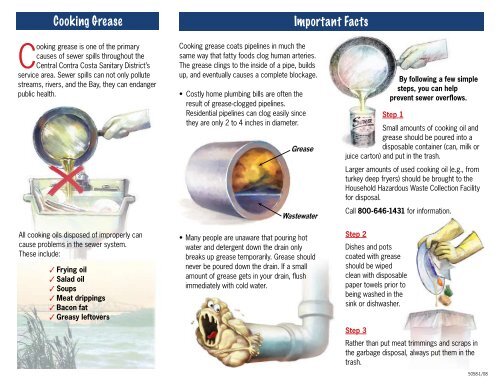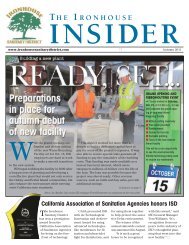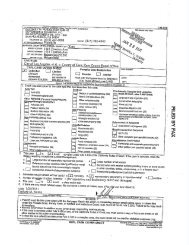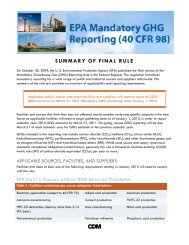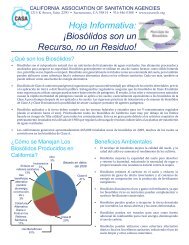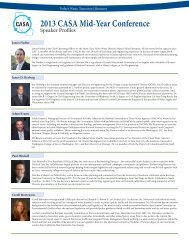FOG Brochure from Central Contra Costa Sanitary District
FOG Brochure from Central Contra Costa Sanitary District
FOG Brochure from Central Contra Costa Sanitary District
You also want an ePaper? Increase the reach of your titles
YUMPU automatically turns print PDFs into web optimized ePapers that Google loves.
Cooking Grease<br />
Important Facts<br />
Cooking grease is one of the primary<br />
causes of sewer spills throughout the<br />
<strong>Central</strong> <strong>Contra</strong> <strong>Costa</strong> <strong>Sanitary</strong> <strong>District</strong>’s<br />
service area. Sewer spills can not only pollute<br />
streams, rivers, and the Bay, they can endanger<br />
public health.<br />
All cooking oils disposed of improperly can<br />
cause problems in the sewer system.<br />
These include:<br />
3 Frying oil<br />
3 Salad oil<br />
3 Soups<br />
3 Meat drippings<br />
3 Bacon fat<br />
3 Greasy leftovers<br />
Cooking grease coats pipelines in much the<br />
same way that fatty foods clog human arteries.<br />
The grease clings to the inside of a pipe, builds<br />
up, and eventually causes a complete blockage.<br />
• Costly home plumbing bills are often the<br />
result of grease-clogged pipelines.<br />
Residential pipelines can clog easily since<br />
they are only 2 to 4 inches in diameter.<br />
Grease<br />
Wastewater<br />
• Many people are unaware that pouring hot<br />
water and detergent down the drain only<br />
breaks up grease temporarily. Grease should<br />
never be poured down the drain. If a small<br />
amount of grease gets in your drain, flush<br />
immediately with cold water.<br />
Step 2<br />
Dishes and pots<br />
coated with grease<br />
should be wiped<br />
clean with disposable<br />
paper towels prior to<br />
being washed in the<br />
sink or dishwasher.<br />
By following a few simple<br />
steps, you can help<br />
prevent sewer overflows.<br />
Step 1<br />
Small amounts of cooking oil and<br />
grease should be poured into a<br />
disposable container (can, milk or<br />
juice carton) and put in the trash.<br />
Larger amounts of used cooking oil (e.g., <strong>from</strong><br />
turkey deep fryers) should be brought to the<br />
Household Hazardous Waste Collection Facility<br />
for disposal.<br />
Call 800-646-1431 for information.<br />
Step 3<br />
Rather than put meat trimmings and scraps in<br />
the garbage disposal, always put them in the<br />
trash.<br />
5058-1/08
Other Causes of Sewer Spills<br />
• The continual flow of nutrient-filled water<br />
found in sewer lines can attract tree roots<br />
through pipe joints and manholes. The roots<br />
can then grow, forming blockages in the<br />
pipes. Always avoid planting trees and shrubs<br />
near residential and <strong>District</strong> sewer lines.<br />
About CCCSD<br />
<strong>Central</strong> <strong>Contra</strong> <strong>Costa</strong> <strong>Sanitary</strong> <strong>District</strong> is a special<br />
enterprise district that collects and cleans an<br />
average of 45 million gallons of wastewater per day at<br />
its Treatment Plant in Martinez. The <strong>District</strong>’s service<br />
area includes Alamo, Clayton, Concord, Danville,<br />
Lafayette, Moraga, Orinda, Pacheco, Pleasant Hill,<br />
Walnut Creek, and portions of Martinez and San Ramon.<br />
The <strong>District</strong> serves 448,000 residents and more than<br />
3,000 businesses in central <strong>Contra</strong> <strong>Costa</strong> County.<br />
• Rocks, debris, vandalism, and construction<br />
are also factors that can contribute to<br />
sewer spills.<br />
Report Sewer Spills!<br />
If you see or smell something<br />
you think might be a sewer spill,<br />
report it immediately by calling<br />
925-933-0990. Be prepared<br />
to describe the location and the<br />
nature of the problem.<br />
Sewage collection and wastewater treatment<br />
(and HHW collection service) for 309,608 people<br />
Wastewater treatment for 135,360 residents<br />
in Concord and Clayton by contract and HHW<br />
collection service<br />
HHW collection service only<br />
CCCSD’s Headquarters, treatment plant, and<br />
HHW Collection Facility are located in Martinez<br />
CCCSD’s Collection System Operations<br />
Department (sewer maintenance) is based in<br />
Walnut Creek<br />
<strong>Central</strong> <strong>Contra</strong> <strong>Costa</strong> <strong>Sanitary</strong> <strong>District</strong><br />
5019 Imhoff Place, Martinez, CA 94553<br />
(925) 228-9500<br />
www.centralsan.org<br />
5058-1/08<br />
<strong>Central</strong> <strong>Contra</strong> <strong>Costa</strong> <strong>Sanitary</strong> <strong>District</strong><br />
5019 Imhoff Place, Martinez, CA 94553<br />
(925) 228-9500<br />
www.centralsan.org


